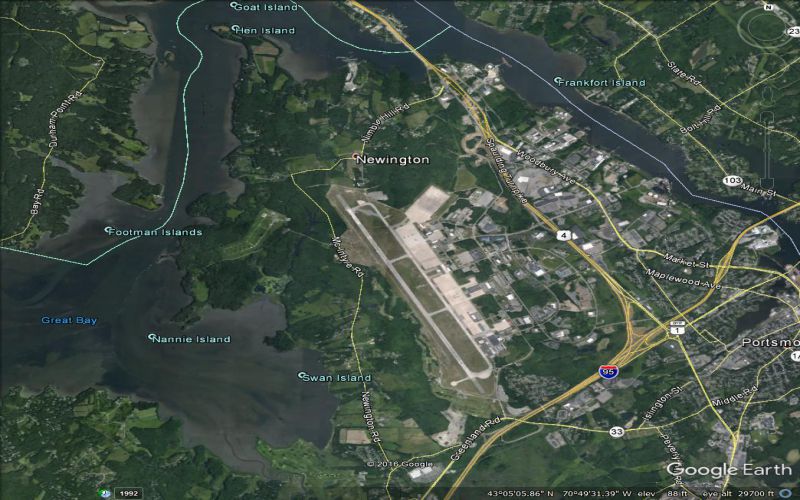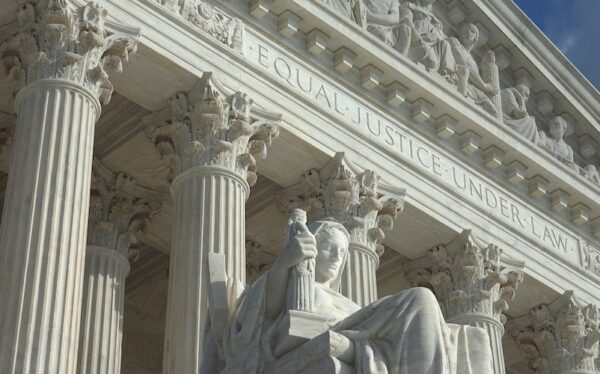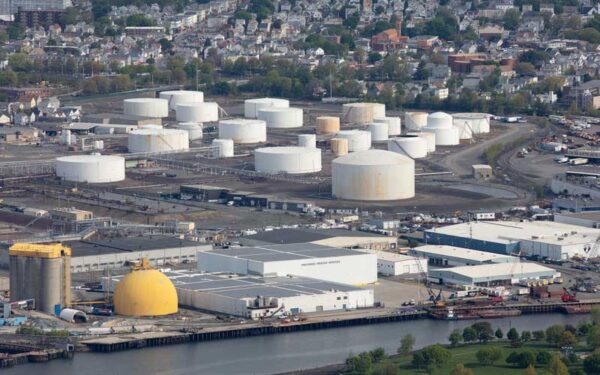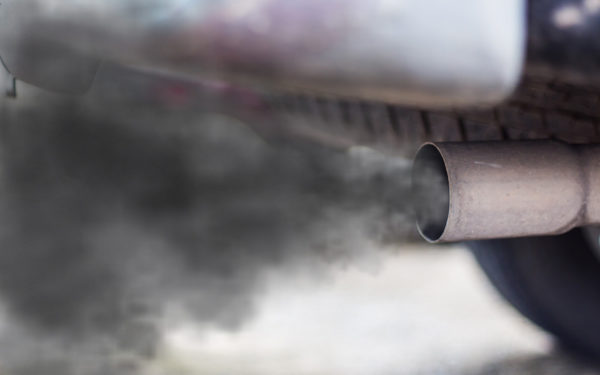
Pease dominates the landscape of Great Bay and the Piscataqua River.
CLF has filed a lawsuit against the redeveloper of the site of the Pease Air Force Base in Portsmouth, New Hampshire, for violating the Clean Water Act. Pollution from the site is fouling local waterways, including the Great Bay estuary, with numerous pollutants, including toxic chemicals of growing concern.
From Air Force Base to a Small “City”
Except for a few hangers along its two-mile runway, you would be hard pressed to recognize any of Pease Air Force Base’s original military buildings. Pease today is a like a small city, replete with all the likely services you would expect to find – restaurants, childcare facilities, banks, a post office, a college, medical and dental services, a hotel, a fire station, a sewage plant, and a 27-hole golf course. More than 9,000 people commute daily to work at one of 250 businesses located there.
However, all is not as rosy as it seems. Pease is in fact responsible for significant levels of pollution being discharged into the Great Bay estuary, which surrounds Pease on three sides. The acreage of impervious surface here – paved parking lots, flat roofs, roads, and, of course, runways – has increased tremendously with redevelopment of Pease. When it rains, stormwater runs over these surfaces and into ditches and brooks. That stormwater carries with it numerous pollutants – oil, gasoline, nitrogen, phosphorus, arsenic, a host of heavy metals, pesticides, and perfluorochemicals (PFCs), to name a few – which are discharged into local waters.
By failing to take actions that prevent these harmful discharges, Pease is violating the Clean Water Act. To force Pease into compliance, CLF recently filed suit against the Pease Development Authority, the entity formed by the state legislature in the 1990s to manage the site’s redevelopment.
Pease’s Responsibility under the Law
Like Portsmouth and so many cities and towns on the Seacoast with their own storm sewer systems, Pease must follow the Clean Water Act by applying for, obtaining, and complying with EPA’s municipal separate storm sewer system (MS4) permit. And under that important permitting program, Pease must develop and institute a stormwater management plan. Unfortunately, it has not done so, putting our waterways and wildlife and the public’s health at risk.
The Chemicals in Our Water
The situation at Pease is especially troubling because of the presence of perfluorochemicals (PFCs), which include perfluorooctane sulfonic acid (PFOS) and perfluorooctanic acid (PFOA), in the polluted stormwater runoff. While the science is still developing, emerging evidence suggests that when these chemicals are present in drinking water, they pose a significant risk to newborn babies and pregnant women. PFOA in public water systems may expose people to kidney and testicular cancer, high cholesterol, thyroid disorders, and hypertension in pregnancy, according to an EPA health advisory issued in 2016. Animal tests have found that developing fetuses are particularly sensitive to PFOA, which also has been linked to liver and kidney toxicity and immune-system problems.
Use of PFCs at Pease dates back decades, as they were common ingredients in firefighting foams used by the Air Force. Over time, PFCs permeated the ground and seeped into the groundwater. With stormwater runoff, they are now draining into our waterways. What’s more, considerable waste generated at Pease during the 1970s and 1980s has ended up down the road at the Coakley Superfund site in North Hampton. PFCs have been detected there in drinking water wells and surface waters off-site.
PFCs are also endangering three Portsmouth public drinking water wells within the aquifer at Pease. One of those wells has been completely offline since 2014 because of PFC contamination. The other two have recently been retrofitted with expensive granular-activated carbon filters to try to avoid contamination.
Ensuring Compliance to Protect our Local Waters
CLF’s lawsuit is about ensuring the health of our local waters and communities, and ensuring Pease Development Authority steps up to its responsibilities by monitoring and reporting the levels of pollutants in its stormwater discharges – including PFCs and nitrogen – and takes action to address them. Pease Development Authority needs to take the requirements of the federal Clean Water Act seriously, and CLF will work to ensure that it does.
If small cities like Portsmouth and Exeter and Durham (to name just a few) are required to implement stormwater management plans and take appropriate actions to protect public waters and public health, Pease Development Authority should play by the same rules.




